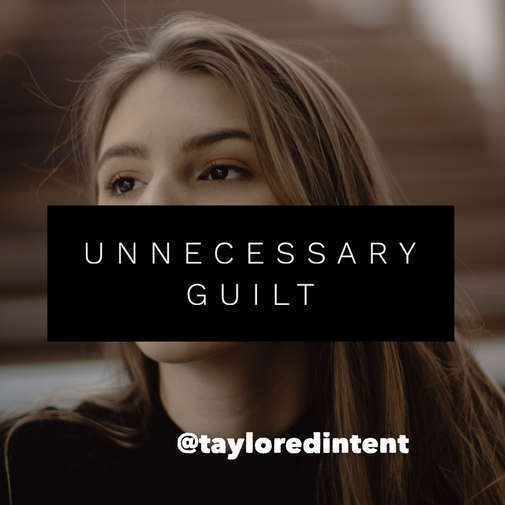|
Photo credit: JC Gellidon from Unsplash Why do we feel sorry when we don't even know what we are sorry for? Is someone making us feel guilty or are we slathering a self-applied layer of guilt just because? How old were we the first time we were ever made to feel guilty? And how old will we be when guilt will be but a distant memory? I have felt guilty for SO many things that were outside of my control over the years. And to what end? Who wins in that scenario? No one. Here are a few examples of unnecessary guilt I have both acquired and shouldered:
Let's dive a little deeper into each of these 4 categories of guilt just in case none of these seem to resonate yet. Guilt by association, proximity, or DNA: I recently read a book about the murders of people of color in America by police. It was a fictional story but one we know so well. After reading the book, I had a very poignant conversation with one of my close friends. As a black woman, she had many thoughts about this problem in America and I listened. As a white woman, I explained to her that knowing these things are happening causes intense feelings of guilt simply because I share the white skin of the guilty. She was surprised that I chose the word "guilt" instead of "shame" or "embarrassment." I also felt feelings of guilt when reading about the Holocaust as I sat in my 4th grade desk carrying a German surname. Were my ancestors part of the Nazi army? I do not know. But as a child, I felt what I would classify as guilt. Now at 47, my friend's comment about guilt versus shame or embarrassment have brought me back to many of my lessons in therapy. Pre-therapy, I assumed guilt and shame were the same or interchangeable, but they really are not. Guilt infers that we have done something wrong, and often for those actions, we can apologize or repair those relationships. Shame infers that WE are something wrong, that something is WRONG with us and for that we seek acceptance and approval. Have I figured out just yet why I feel guilt or shame or embarrassment when white individuals harm or dehumanize or murder persons of color? Is that a normal emotional response as a white woman who considers herself an ally? Is empathy difficult to delineate from culpability with a shared "guilty" race? OR, is the true issue - and one that is really honed in upon in the book - that SILENCE is not the answer? Is my lack of action or voice to these injustices the reason I feel some type of way? I encourage ALL of us to consider this moving forward in our daily lives. Guilt for words or actions from decades ago: Have you ever replayed a conversation or an interaction from DECADES ago? What about from childhood or when you were a hormone-infused, emotionally-immature high schooler or young adult? How many times can we beat ourselves up for something, and for how many YEARS? Guilt for NOT doing what we should have, could have, would have: This has happened to all of us. We should have gone to that funeral service. We could have sent a meal to that family or friend. We would have been there, but we had our own "stuff" going on and we didn't want to burden the person in need. Most of us who are empathetic individuals know this feeling all too well. Time passes. We believe it would be awkward after such time to reach back out. Guilt for causing disappointment: This guilt can be similar to some of the other guilt mentioned above, BUT it can also be very recent and current. Examples: I didn't go to girls' night. I forgot to mail the package my husband asked me to mail. I laughed at something inappropriate and realize later that I could have caused harm. I spoke to someone I love in anger. I do not have a magic wand to help us erase or wave away these unnecessary feelings of guilt. I do, however, know that harboring guilt is futile. Whenever I feel guilt (or shame) now, I stop. I analyze why I am feeling those feelings. If there is an action or inaction I am truly sorry for, I try to make amends and apologize sooner rather than later. I may journal about the feelings or events so that I can grow and learn from the situation. If the triggering event for the guilt is OLD or NOT related to me or NOT something I can remedy, I am learning to let it go. Emotions are like waves in the ocean- they come in, wash over us, and go back out. The ocean will remain. We will remain. And the waves are temporary. Viewing emotions in this manner is life-giving! I would love to hear from you if any of this resonates with you. You can comment below or connect with me on social media. Here's to more days without guilt and shame. Godspeed. I love interacting with my readers. For more of an inside look into my days, you can follow me on TikTok, Instagram, or Facebook. Please support my fellow hope*writers by reading their works inspired by the prompt word UNNECESSARY. Unnecessary Burdens by Sharla Hallett https://sharlahallett.com/unnecessary-burdens/ Career and Mom Life: The Big, Unnecessary Sacrifice by Ashley Olivine https://www.ashleyolivine.com/career-and-mom-life/ Release the Unnecessary Weight and Find Joy As You Run With Jesus by Lisa Crowder https://lisacrowder.substack.com/p/release-unnecessary-weight-and-find-joy
0 Comments
Leave a Reply. |
Proudly powered by Weebly
